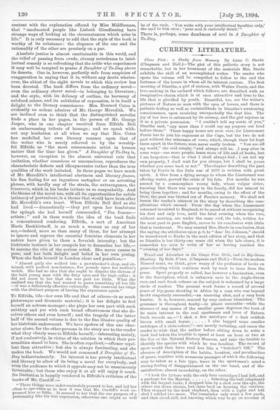CURRENT LITERATURE.
Clove Pink : a Study from Memory. By Anna C. Steele (Chapman and Hall.)—The plot of this pathetic story is not remarkable, but in her treatment of the materials Mrs. Steele exhibits the skill of an accomplished writer. The reader who opens the volume will be compelled to follow to the end the fortunes of the lovers in whom all its interest centres. The first• meeting of Diantha, a girl of sixteen, with Walter Ferris, and the love-making in the orchard which follows, are described with an imaginative charm which is at once attractive and true to the. life that is glorified by youth. Beautiful, too, are the writer's pictures of Nature as seen with the eyes of lovers, and there is pathetic feeling as well as verisimilitude in Diantha's awakening consciousness, upon receiving unexpectedly the first kiss. The joy of her love is enhanced by its secrecy, and the girl rejoices in it as a private possession. " I couldn't tell my aunts of you,' Diantha said, "any more than I could say my prayers out loud before them." These happy hours are soon over, for Lieutenant Ferris has to join his regiment at the Cape, but the two do not part without the utterance of vows, which, though their lot kept them apart in the future, were never really broken. " You are all my world," she said simply, " and always will be. .I may alter in some ways—see more people, learn more of life and of books, but I am bespoken—that is what I shall always feel ; I am not my own property, I shall wait for you always, but I shall be yours whether you come back or not" The chapter describing the part taken by Ferris in the Zulu war of 1879 is written with great spirit. A blow from a dying savage to whom the Lieutenant was offering water, proved the crisis of his fate. For months he was nursed by a commonplace young lady, whose vulgar sister, knowing that there was money in the family, did her utmost to bring them together ; and for months, owing to the effect of the blow, the past was blotted out of Ferris's memory. We shall not lessen the reader's interest in the story by describing the com- plications which ensued. From the day when the Lieutenant returned invalided to England, to be gazed at without recognising his first and only love, until the fatal evening when the two, without meeting, are under the same roof, the tale, written for the most part in pure English, moves to its conclusion with little that is irrelevant. We may remind Mrs. Steele in conclusion, that the saying she attributes upon p. 6, to " dear Dr. Johnson," should be transferred to Burke in the next edition of her story, and that as Diantha is but thirty-one years old when the tale closes, it is somewhat too soon to write of her as having reached the " evening of her days."


































 Previous page
Previous page